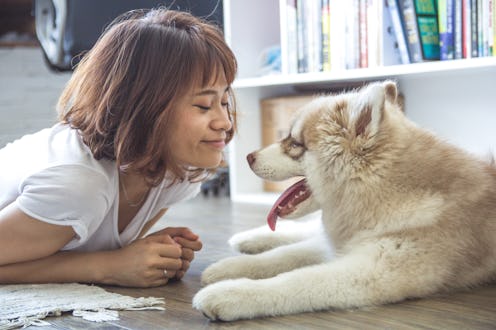Life
Your Dog Will Totally Lie To You For Food
Don't believe those baleful puppy dog eyes when there's a treat on the line. According to a new study, when it comes to a juicy sausage, your beloved pooch is not above deception: It seems dogs will lie to get what they want — and they're particularly competitive over food. Published this month in the journal Animal Cognition, the research found that dogs will even go so far as to trick their owner out of a particularly tasty snack. That's right: "Man's best friend" may have just become man's best frenemy.
While it's hard to picture our adorable furbabies as devious masterminds, researchers out of the University of Zurich in Switzerland sought to investigate our pup's cognition by testing whether "dogs are able to mislead a human competitor" and pull off complex "tactical deception." In what one can imagine was the cutest group of subjects ever, 27 adult dogs of different breeds were trained to recognize two female human partners by their level of generosity. One human was designated "cooperative," always giving the dog a treat and establishing good will, whereas the other human was deemed the "competitive" one, keeping the treat for herself after presenting it to the pup.
You can probably guess which owner the puppers preferred to spend time with.
Once the two "owner" roles were established, the dogs were then shown three identical boxes: One filled with tasty sausage, one with dry dog biscuits, and one that was empty. The furry participants were then matched up with a human and commanded to "Show me the food." The human established as cooperative would allow the dogs to eat whatever was in the box, whereas the competitive partner would hoard whatever was in the box for themselves, incentivizing the dog to lead the competitive partner to the empty box and the cooperative partner to the preferred treat.
After two trials with each partner were performed, researchers found that the doggy participants led the cooperative partner to the box containing sausage and the competitive partner to the empty box more than half the time. "On both test days, the dogs were more likely to lead the cooperative partner than the competitive one to the box containing the preferred food, and this effect was stronger on the second than on the first test day," the study's authors wrote, concluding that there was more than chance at play in these decisions and some pretty complex evaluation of options.
The quick-thinking pups' learned differentiation of the partners also translated to the tests without further instructions. “They were really quickly able to differentiate between the two partners. There was no additional learning step needed,” the study's lead author Marianne Heberlein told New Scientist.
While we should applaud the dogs' industriousness, don't fool yourself into thinking that your own loyal little furball isn't above manipulating you for a reward. In this day and age, it seems honesty is hard to come by — even from our pets.
